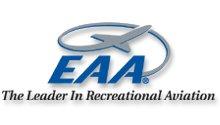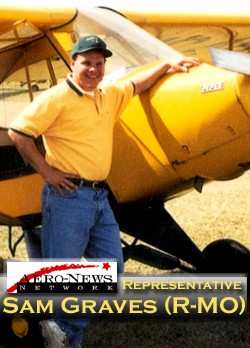Group "Heartened" By Opposition On Capital Hill
It's an egregious plan... and several lawmakers recognize it.
That's the word from the Experimental Aircraft Association, which
told ANN Thursday the group is "heartened" to hear broad skepticism
and bipartisan opposition to the Bush Administration's FY2008
budget proposal for funding the FAA during the House Transportation
and Infrastructure Subcommittee on Aviation hearing on Wednesday
afternoon.

As Aero-News reported in Real Time Wednesday, the proposal,
presented by FAA Administrator Marion Blakey, implements user fees
and imposes a drastic increase in general aviation fuel taxes to
fund the nation's air traffic control system and capital
improvement programs.
"We're extremely pleased that several members of the aviation
subcommittee share our opposition to the administration's proposed
new funding scheme," said EAA's Earl Lawrence, vice president of
government and regulatory affairs. "They realize, as do EAA and the
other GA organizations, that this proposal would be incredibly
harmful to our nation's aviation infrastructure. We'll continue to
stand united to keep aviation affordable, less complex, and more
accessible for all."
 Subcommittee Chairman
Jerry F. Costello (D-Ill.) questioned why the Administration would
put forth a plan that actually results in less revenue.
Subcommittee Chairman
Jerry F. Costello (D-Ill.) questioned why the Administration would
put forth a plan that actually results in less revenue.
"While FAA has cited the need to finance a major new air traffic
control modernization initiative as a reason for reforming the
current tax structure, the Administration's data indicates that in
FY 2008, user fees and excise taxes under the new proposal would
hypothetically yield approximately $600 million less in FY2008 than
maintaining the current tax structure and over $900 million less
from FY2009 to FY2012," Costello said. "I question the wisdom of
moving to a new financing system that will not generate as much
revenue as the current tax structure when we clearly need to make
critical investments now to ensure that our nation's air traffic
control infrastructure is robust for the future."
Rep. Robin Hayes (R-NC) called the 300 percent tax hike on GA
fuels (from 21 to 70 cents per gallon) "deadly," and felt there was
"no way users fees are fair, equitable, and are going to work."
Rep. Leonard Boswell (D-Iowa) called the proposal an "unfair,
unwise," approach. "We do not have to do it. Can't we just sit
together and work this out?"
Boswell's Michigan colleague from across the aisle, Vern Ehlers
(EAA 685118), went a step further -- pronouncing the proposal "Dead
on Arrival." Ehlers later tempered his statement somewhat, by
extending an olive branch to the Administrator -- "I don't mean to
say we can't get this thing done, but this is so important that we
need to sit down together and work out long-range solutions."
Much concern was expressed about the Administration's decreased
level of funding for the Airport Improvement Program and its impact
on small airports. The proposal cuts entitlement funds to airports
with fewer than 10 based aircraft that previously received
$150,000.
 Rep. Peter DeFazio
(D-OR), who agreed with Ehler's comments but stopped short of
pronouncing it DOA, addressed Blakey's assertion that the Airport
and Airway Trust Fund was at historically low levels, reminding her
that the Congress mandated the FAA to spend the trust fund down
when it was at $11.7 billion.
Rep. Peter DeFazio
(D-OR), who agreed with Ehler's comments but stopped short of
pronouncing it DOA, addressed Blakey's assertion that the Airport
and Airway Trust Fund was at historically low levels, reminding her
that the Congress mandated the FAA to spend the trust fund down
when it was at $11.7 billion.
"We could just as easily keep the current system and allow it to
grow back again. Why go through the battle to reallocate costs for
less money?" DiFazio also noted the proposed 300 percent fuel tax
hike (56.4 cents for ATC, 13.6 cents for the trust fund) would
"depress GA activity and at best result in lower revenue."
Rep. Sam Graves (R-MO), EAA 619761 and an annual AirVenture
attendee, is terribly disturbed by this proposal.
"I don't even know where to start," he said. "I understand that
you come in on opposite sides and work toward the middle, but even
the middle is unacceptable. I don't see anything but bad news with
this."
Graves added that he was "floored" by the 70-cent gas tax,
expecting perhaps a 5- or 10-cent increase. "I'm going to be pelted
by pilots back home. What are pilots getting from this tax increase
when they don't even use the system? It really, really disturbs
me."
Graves asked about the 25 FAA activities that will incur fees
under the new budget since only 12 are defined in the proposal.
Blakey said they would work with the stakeholders to set the fees,
so we really don't know what those other 13 items are, nor do we
know what the price will be.
Graves replied, "We don't know what it costs, we don't know what
it is, what we're paying for, so why are we going to start charging
for it?" He also pointed out that the whole ATC system is
ostensibly being overhauled to deal with congestion, "but isn't
congestion an airport function? Runways and demands at specific
airports. ATC overhaul will not improve overcapacity at specific
airports and insufficient runways."
"The skies will be safer because nobody can fly anymore," Graves
concluded.
(Unless, that is, they're travelling on the airlines...
Ed.)
 ANN's Daily Aero-Linx (05.06.25)
ANN's Daily Aero-Linx (05.06.25) ANN's Daily Aero-Term (05.06.25): Ultrahigh Frequency (UHF)
ANN's Daily Aero-Term (05.06.25): Ultrahigh Frequency (UHF) ANN FAQ: Q&A 101
ANN FAQ: Q&A 101 Classic Aero-TV: Virtual Reality Painting--PPG Leverages Technology for Training
Classic Aero-TV: Virtual Reality Painting--PPG Leverages Technology for Training Airborne 05.02.25: Joby Crewed Milestone, Diamond Club, Canadian Pilot Insurance
Airborne 05.02.25: Joby Crewed Milestone, Diamond Club, Canadian Pilot Insurance





